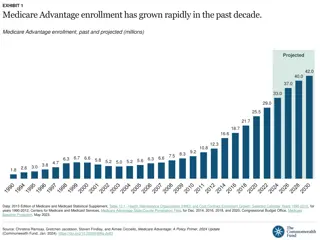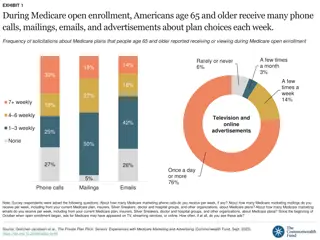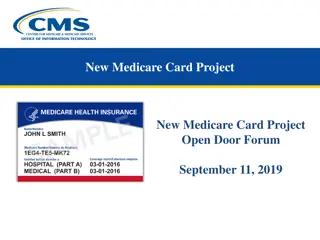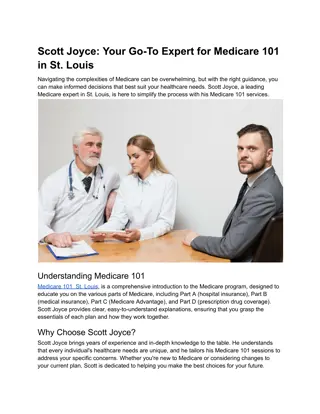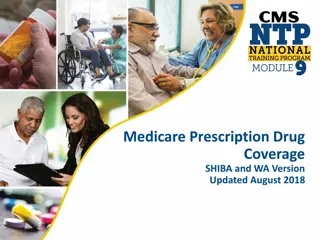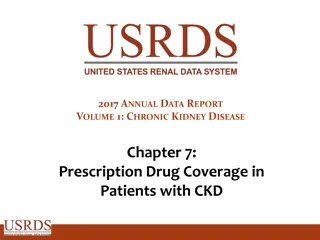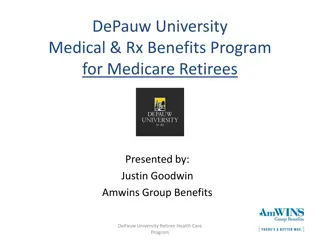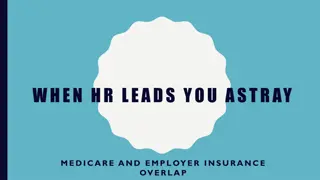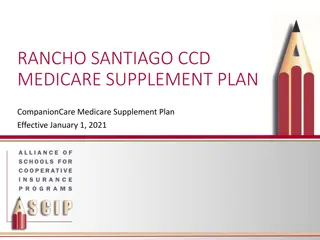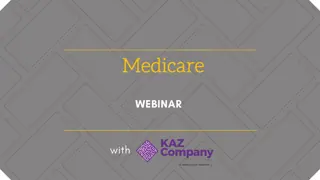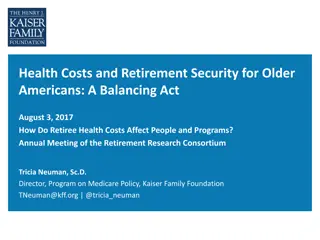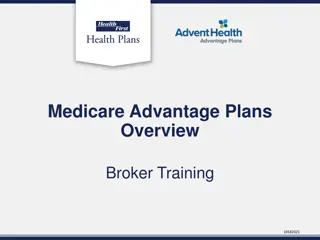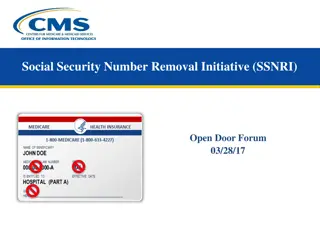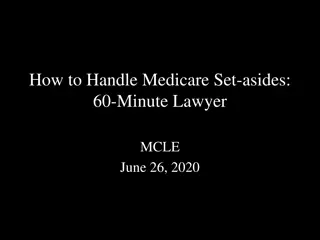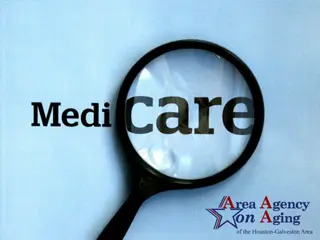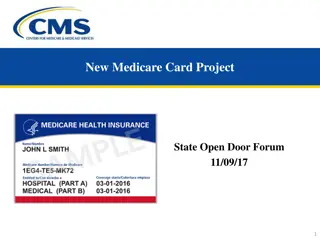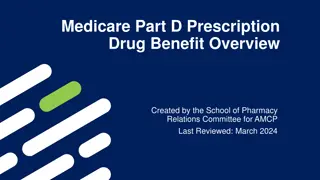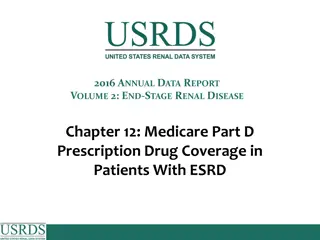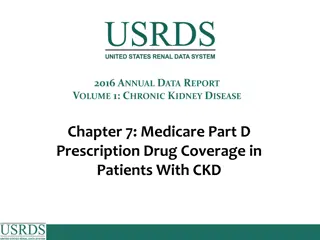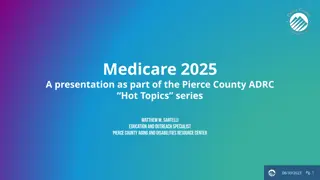Medicare Coverage Choices
Medicare is a health insurance program for citizens aged 65 and older, providing coverage for various medical services. Learn about Original Medicare vs. Medicare Advantage, key coverage choices, and how to qualify for Part A Hospital Insurance.
Download Presentation

Please find below an Image/Link to download the presentation.
The content on the website is provided AS IS for your information and personal use only. It may not be sold, licensed, or shared on other websites without obtaining consent from the author.If you encounter any issues during the download, it is possible that the publisher has removed the file from their server.
You are allowed to download the files provided on this website for personal or commercial use, subject to the condition that they are used lawfully. All files are the property of their respective owners.
The content on the website is provided AS IS for your information and personal use only. It may not be sold, licensed, or shared on other websites without obtaining consent from the author.
E N D
Presentation Transcript
Medicare 101 Prince William Area Agency on Aging Virginia Insurance Counseling & Assistance Program (VICAP) Rosemari Walker 703-792-4156 Rwalker@pwcgov.org
Virginia Insurance Counseling & Assistance Program Virginia Insurance Counseling & Assistance Program (VICAP) (VICAP) We provide free, independent, no-conflict of interest, objective advice on Medicare and on health insurance problems you may have. Disclaimer: We can help, but do NOT make a health insurance changes/decisions without reconfirming or seeing it in writing. Use your employment HR Departments to double-check. 3
What is Medicare? Health insurance program for citizens (or legally here for at least 5 years) 65 and older (about 64 million people). Under age 65 starting 2 years after you start getting Social Security disability payments (about 8.5million people) Sooner with kidney failure (ESRD), and Lou Gehrig s Disease (ALS). An individual insurance plan no family, spouse or group rates Administered by the Centers for Medicare & Medicaid Services (CMS) in the U.S. Dept. of Health & Human Services. 4
Medicare Coverage Choices Original Medicare vs. Medicare Advantage Original, Traditional, Fee-for-Service Medicare (Part A, B) Traditional Medicare program administered directly through the Federal government s contractors. May enroll in a Medigap Supplemental Plan and stand-alone Part D prescription drug plan Medicare Advantage (Part C) Medicare health plan (managed care) offered through private insurance companies, heavily regulated by the Federal government. Many plans include prescription drug coverage. 5
KEY MEDICARE COVERAGE CHOICES Medicare Advantage a/k/a Medicare Part C Original Medicare Includes Part A (Hospital Insurance) and/or Part B (Medical Insurance) Decide if you want prescription drug coverage (Part D) private insurance companies approved by Medicare Decide if you want supplemental coverage. Individual privately- purchased Medigap plan, or ability to enroll in a employee retiree plan or military retiree plan Combines Part A, Part B and usually Part D. Private insurance companies approved by Medicare provide this coverage. No supplement/Medigap plan allowed for uncovered cost! OR 6
Part A - Hospital Insurance Automatically qualify at 65 (still have to enroll), no charge you or your spouse (current, ex, or deceased) earn it through 10 years (40 quarters) of work, paying Social Security taxes, so you pay NO premiums after you are eligible at 65. If you haven t worked 40 quarters, you can buy it. 7
Part A - Hospital Insurance Medicare Part A helps you pay for: Inpatient hospital care for up to 90 days each benefit period, plus 60 lifetime reserve days in a general hospital. It also covers up to 190 lifetime days in a Medicare-certified specialty psychiatric hospital. Skilled nursing facility (SNF) care for up to 100 days each benefit period. To qualify, you must have been in the hospital for at least three consecutive days in the 30 days before admission and need skilled nursing services seven days a week, or physical, occupational or speech therapy services five days a week. Home health care for up to 100 days. To qualify, you must have been in the hospital for at least three days in the 14 days before receiving care and be homebound. Note: You can get coverage for home health care without a hospital stay through Medicare Part B. Hospice Care for as long as your doctor certifies you need care. To qualify, a doctor must certify that you are terminally ill and have a life expectancy of six months or less. 8
Part B - Medical Insurance Voluntary, pay monthly premium per individual Those new to Medicare this year pay $164.90/month If you do not sign up for Part B when you are eligible, you could face a premium penalty. 10% for each full 12 month period eligible but not enrolled; paid for as long as the person has Part B Do most Doctors see Medicare patients? Yes, but check and look for those who take assignment. 9
Part B - Medical Insurance Medicare Part B helps pay for many common types of health care: Doctors' services. Durable medical equipment (DME)* if your doctor certifies you need it and you buy or rent it from a Medicare-certified supplier. Ambulance services if your health requires ambulance transport and you are traveling to or from certain locations. Many preventive care services. Outpatient physical, speech, and occupational therapy services provided by a Medicare-certified physical, speech, or occupational therapist. Chiropractic care when manipulation of the spine is medically necessary to fix a subluxation of the spine. A subluxation is when one or more of the bones of the spine move out of position. Outpatient mental health services. Home health services if they need skilled nursing or therapy services. X-rays and lab tests. A few prescription drugs, such as immunosuppresent drugs, some anti-cancer drugs, some anti-emetic drugs, some dialysis drugs and physician-administered drugs that persons do not usually administer themselves. Medicare does not cover all health care services. Medicare will only pay for Part B services and items (except most prescription drugs) that are ordered or prescribed by a Medicare-enrolled provider. *Medicare will only cover durable medical equipment if received from an approved supplier. 10
Medicare does NOT cover some services In general, Original Medicare does not help with dental, hearing aids, normal eye care (but does cover cataract surgery, etc.), foreign travel, etc. You can buy private dental and vision insurance, or get it through a Medicare Advantage Plan. Medicare does not cover custodial, non-skilled care nursing home, assisted living, Alzheimer s facility-type care. 11
Part D - Prescription Drug Plans Voluntary; run by private, for-profit plans. You can shop on Medicare.gov website for one of 24 stand-alone plans that s best for you (if choosing Original Medicare). Pay a monthly premium (ranges from about $5.10 to $107.90/month); Need to check each year to see if plan has changed. Started in 2006. At that time, if a person entered the coverage gap or donut hole , they were responsible for about $3,725 in the costs of their prescriptions. By 2023, the basic benefit will be a deductible, you ll pay about 25% of roughly first $11,206 in drug costs, then owe about 5% of drug s cost (95% will be covered) if the drug is on the formulary. 12
Medicare Advantage Plans Part C Voluntary; run by private, for-profit plans. You can shop on Medicare.gov website for one of 28 Part C plans (Also known as Advantage Plans) Pay a premium ($0 to $139.00/month) and get Part A, B (maybe) prescription drug benefits through plan Use doctors and hospitals in plan s network Must still pay Part B premium; can NOT buy Medigap policy Benefits and cost sharing may differ from Original Medicare May get extra benefits such as vision, hearing and dental services Prescription drug coverage usually included Still in Medicare Program: Have Medicare rights and protections 13
Medicare Enrollment Periods Initial Enrollment Period: 7 months around your 65 birthday month. 65 years old If under 65 years old and receiving Social Security disability benefits, Medicare Part A & Part B start the 25th month of receiving disability benefits Special Enrollment Periods Based on current/active employment of beneficiary or spouse 8 months to enroll in Parts A and B, 63 days to enroll in a stand-alone Part D plan or Medicare Advantage/Part C plan Other qualifying events, such as change of address or losing current coverage; 2 months to enroll to make changes to stand-alone Part D plan or Medicare Advantage plan General Enrollment Period: January 1st- March 31St. If you did not sign up for Part A or Part B during your Initial Enrollment Period, or Special Enrollment Period (if applicable). Enrollment is January through March each year with start date of July 1st. Open Enrollment Period: October 15th-December 7th. Join a Medicare Advantage Plan or Part D plan, or make changes to these plans 14
Cost Sharing Requirement Cost-Sharing Requirement 2022 2023 First-Day Part A Hospital Deductible $1556.00 $1600.00 Daily Part A Coinsurance for the 61st - 90th Day of a Hospital Stay $389.00 $400.00 Daily Part A Coinsurance for Hospital Stays Longer than 90 Days $742.00 $778.00 Daily Part A Coinsurance for the 21st through 100th day in a Skilled Nursing Facility $194.50 $200.00 Standard Monthly Part B Premium Those enrolling in Part B for the first time $170.10 $164.90 Medicare Part B Deductible $233.00 $233.00? Medicare Part B Copay 20% 20% Base Part D Beneficiary Premium Average $32.74 $33.00? Part D Deductible $480.00 $505.00 15
Higher Premium Chart You Pay If Your Yearly Income is *Part D? Part B Single Married Couple Plan Premium $164.90 Under $97,000 Under $194,000 + $12.40 $230.80 $97.001-$123,000 $194,000-$246,000 + $32.10 $329.70 $123,000-$153,000 $246,000-$306,000 + $51.70 $428.60 $153,000-$183,000 $306,000-$366,000 + $71.30 $527.50 $183,000-$500,000 $366,000-$750,000 16
Medigap Supplemental Plans If you choose Original Fee-for-Service Medicare, these optional, private insurance polices cover deductibles, co-pays, and some other things that Medicare does not pay for they largely fill in the non-Part D financial gaps in Medicare. Heavily regulated by Feds and State Insurance Departments to prevent consumer abuses If you don t have a good retiree health plan (like Feds), shop for one of 10 Medigap models. Each model, for e.g. Plan G, covers the exact same things. In general, go with the lowest cost plan in the model you want. KEY: To avoid medical underwriting, and to have a guaranteed right to get a policy, buy within 6 months after turning 65 AND enrolling in Part B (e.g., you finally enroll in Part B at age 70 - you have a 6-month window where they have to sell you a policy, no questions asked about your health history). With a few exceptions, you probably will not be able to easily switch Medigap plans after you first choose one. Once you do not have a Medigap plan, it may be impossible or difficult to re-purchase an affordable one. This can make switching back and forth between them difficult. 17
Medicare Savings Programs Can I get help paying for my Medicare Part B premiums? If you have limited income and assets, you may qualify for help paying for your Medicare Part B premium and other Medicare costs. Medicare and your state Medicaid program work together to provide you with this help. This help is called the Medicare Savings Programs. Medicare Savings Programs There are four different Medicare Savings Programs. Each program has a different income and resource eligibility limit. Even if you do not qualify for Medicaid, you may qualify for one of these programs to help you cover your Medicare costs. The programs are listed below, along with what each program pays for, and the income and resource level limits you must meet to qualify. Qualified Medicare Beneficiary (QMB) What it covers: Medicare premiums (Part A, if applicable, and Part B), deductibles, copayments, and/or coinsurance Specified Low-Income Beneficiary (SLMB) What it covers: Medicare Part B premium Qualified Individual (QI) What it covers: Medicare Part B premium No Enrollment Period: Enroll Anytime 18
Medicare Savings Programs Income and Asset Limits 2022 Individual Couple 1. QMB Monthly Income & Asset Limits for 2022 (up to 100% FPL+ $20)* $1,153 $1,546 All States except Alaska and Hawaii. $8,400 $12,600 , Asset Limits 2. SLMB Monthly Income & Asset Limits for 2022 (less than 120% FPL+ $20)* $1,379 $1,851 All States except Alaska and Hawaii: $8,400 $12,600 Asset Limits 3. QI Monthly Income & Asset Limits for 2022 (less than 135% FPL+ $20)* $1,549 $2,080 All States except Alaska and Hawaii: $8,400 Asset Limits $12,600 Asset limits includes the allowed amount for burial expenses; Single $1,500; Couple $3,000 19
EXTRA HELP PROGRAM EXTRA HELP PROGRAM A program to help people with limited income and resources pay Medicare drug costs. No enrollment period: enroll anytime Single person monthly income: $1719.00 Resources: $15,510 (with Burial Expenses) Married Couple monthly income: $2309.00 Resources: $30,950 (with Burial Expenses) Apply at SSA.gov. 21
Resources Medicare https://www.medicare.gov/ 1-800-633-4227 Social Security Administration https://www.ssa.gov/ 1-800-772-1213 VA Medicaid https://commonhelp.virginia.gov/access/ 1-855-242-8282 (to apply); PW County 703-792-7500 NCOA http://ncoa.org/ Medicare Rights Center https://www.medicarerights.org/ https://www.medicareinteractive.org/ Q1 Medicare https://q1medicare.com/ 22
Medicare Fraud Medicare Fraud Contact Virginia s SMP (Senior Medicare Patrol) at 1-800-938-8885 or www.VirginiaSMP.org 23



